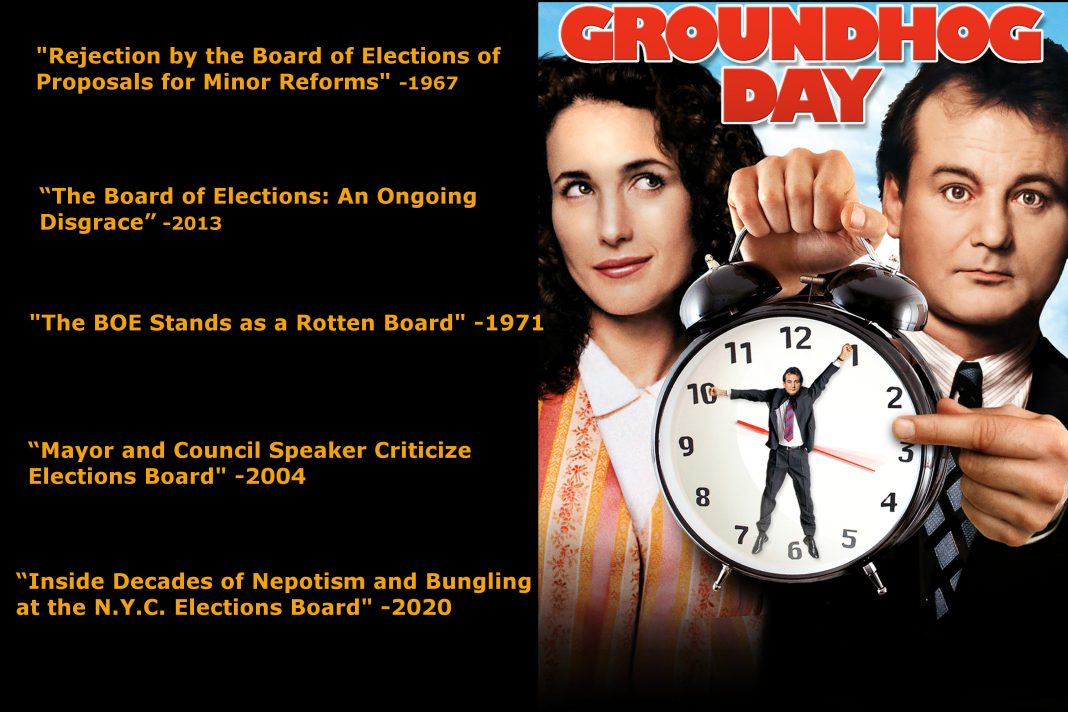By: Gary Tilzer
We all know that BOE is a patronage factory for the party bosses and elected officials that was created during the club house Tammany Hall era 100 years ago. It an election gatekeeper that protects right-wing conservatives to far left incumbents elected officials along with the party-controlled local courts, from challengers. It is a clown show of incompetence and corruption, that has disrupted several elections over the decades. It has survived a half century of calls and efforts to reform.
Those writing that the Rank Choice Voting (RCV) 135,000 test votes miscount in the mayor’s race was the final tipping point and that change to the BOE is coming, if the past is prologue, they are wrong. It seems likely that we are heading into a long, hot summer of lawsuits, hand-counts, and charges from incompetence, cheating to racism aimed at the BOE and the RCV system. The Garcia, Wiley, and Adams campaigns have already lawyered up with election experts, many who have the political power to make things happen inside the very political BOE. Expect the lawyers representing the mayoral candidates who are behind to target rejected ballots and those that are not marked properly, just like Florida in 2000. The Jewish Voice wrote on June 6th “Expect Most of the Primary Vote Counting to End in Court, in Confusion, & in Distrust.”

Susan Lerner, the head of Common Cause New York, who pushed for the RVC charter change, has been around for decades of BOE political corruption and mismanagement, should have warned the public that the BOE needed to be fixed before RCV complex system of voting started. Lerner is chairperson of the board of a non-profit called Rank the Vote NYC, fought against the lawsuit that sought to delay the start of RCV until after this year’s important complex city elections. Lerner said, “Seeking to invalidate the results of a decisive, free and fair election is an attack on our democracy.” Lerner was not speaking about this 2021 elections, but the 2019 low turnout election where RCV without much discussion was past. Thanks to learner and the Times and Daily News which supported RCV, the city now faces a perfect storm of the BOE destroying confidence in a new mayor that must be strong to work from day one to repair, save NYC.
The incompetence of the BOE has become the story of the mayor’s race. Not the reality that NYC has lost 1/2 million jobs — more than any other American city — and has an unemployment nearly twice the national average. Midtown is a ghost town, Gun violence and attacks on tourists are through the roof, subway ridership is a third of what it was, and NYC public school enrollment has plunged.
Comprehensive reform is desperately needed but will take years: Because New York’s constitution hands over to the top two political parties the job of selecting the people who run our elections, we often end up with incompetent hacks commissioners appointed by the city’s five boroughs democratic and republican parties being rewarded for little more than partisan loyalty. 1,096,635 million registered voters as members of the independence, WFP and conservatives’ parties have no representation on the BOE, despite being twice as large as the number of 501,848 republican party members.
NYC BOE Reform: Groundhog Day (1960’s to 2021)
The Times and other papers frequently wrote for the last half century what needed to be done to reform the BOE. Those stories mostly editorials were usually published after the BOE messed up. Elected officials like Senator Liz Krueger who introduces legislations and press releases for more BOE oversite used the latest mess of the BOE to their own advantage. The press which prints Krueger press releases would serve the public better if they as the senator to name names of her fellow collogues that obtain jobs for their family or relatives at the BOE. “Powerful NYC Democrat demands Board of Elections overhaul after ‘total collapse,” August 2020.
Progressives Have Done Nothing to Reform or Reimagine the BOE
Since 2019 the liberal anti-IDC democrats have run Albany, yet there has been no attempt to reform the BOE. Incumbents elected officials are afraid to go against the BOE, they are very mind full of what happen to Manhattan Assemblywoman Rebecca Seawright – who was knocked off the Democratic Party ballot line last year over paperwork snafus during the peak of the coronavirus pandemic.
New York is the only state in the country with local election boards whose staffers are chosen almost entirely by Democratic and Republican Party bosses, and the board in New York City illustrates the pitfalls. In recent years, the board has made increasingly high-profile blunders, from purging 200,000 people from rolls ahead of the 2016 election to forcing some voters to wait in four-hour lines in 2018 because of scanning equipment failures. In 2020 the BOE bungled the distribution of absentee ballots. Did anyone expect something different this year? The BOE even refused help on the new RCV software IT support from its vendor. While the pols do all they can to ignore reform, the BOE itself operates from a bunker trying to keep secret its connected patronage as it functions to help the connected machines and city’s political insiders.
In 1940, a city investigation found the BOE was plagued by “illegality, inefficiency, laxity and waste.” In 1971, a New York Times editorial derided it as “at best a semi‐functioning anachronism.” And in 1985, another city inquiry said it had an “almost embarrassing lack of understanding” of its job.
The speaker of the city council and the Assembly have no appetite to take on the party machine control of the BOE. Senate Majority Leader Andrea Stewart-Cousins responded to public outrage by setting up a committee to study problems at the BOE, to buy time until outrage dies down? All the majority senate leader needs to do is read the past editorials of the NY Times for the last half century about the problems at the BOE.
NY Times 1967 – The rejection by the Board of Elections of proposals for minor reforms in its procedures is a re minder that this agency is one of the most antiquated, irrational, and inequitable institutions of municipal government. It is an unadulterated anachronism that should long ago have been converted into an instructional museum piece of past political injustice. . . The Board has vast powers. It passes on the validity of petitions, thereby qualifying or disqualifying candidates. . . Supervisors the elections and tabulates the count. . . Its extensive discretionary power can be used, in the complex maze of elections laws technicalities, to discriminate against reformers and insurgents. . . The NYS revise the law to provide an elections commission that will be representative and unbiased.
NY Times 2013, By Eleanor Randolph – “The Board of Elections: An Ongoing Disgrace.” Elections in New York City are an ongoing disgrace. In a city where everything is supposed to happen faster than anywhere else (hence the New York minute), the Board of Elections took more than two weeks to count votes after the primary election on September 10 — finally finishing on Friday, September 27. That is an eon job by today’s standards, and it is an embarrassment. The board’s problems stem from the fact that it is run by political party leaders who fill vacancies the old-fashioned way: with friends or relatives. A job at the city’s elections board is all about connections at a time when the city desperately needs professionals and experts — or at least people who know how to use a computer.”
NY Times 2004 – “Mayor and Council Speaker Criticize Elections Board. On a day of heavy turnout at the polls, phones at the board’s office went unanswered, information on where to vote was hard to obtain and broken voting machines and befuddled workers greeted many voters, some of whom stood in line for nearly two hours at polls around the city. The New York Public Interest Group logged more than 3,000 phone calls on its hot line from voters who had experienced problems.”
NY Times 2020 – “Inside Decades of Nepotism and Bungling at the N.Y.C. Elections Board Some staffers read or watch Netflix at the office, while others punch in and then go shopping or to the gym, current and former employees said.”
NY Times 1971 – “The board stands as a rotten board. It at best a semi‐functioning anachronism. Membership on it is considered a patronage plum. The pay is good, the work‐load light. The patronage aspect of the Board of Elections carries over into the city’s total election mechanism, built on a mockery of bipartisanship that demands the appointment of one Democrat for one Republican and little work for either one. Election inspectors are selected based on party loyalty, rather than merit, and they receive so little training and preparation for their jobs that the city would probably never get through an election without policemen at every polling place.
Does the BOE Give the Voters and Candidate Brooklyn Equal Protection?

In 1989 the U.S. Supreme Court unanimously declared the structure of the New York City Board of Estimate unconstitutional on the grounds that the city’s most populous borough (Brooklyn) had no greater effective representation on the board than the city’s least populous borough (Staten Island), in violation of the Fourteenth Amendment’s Equal Protection, in violation of the Fourteenth Amendment’s Equal Protection Clause pursuant to the Court’s 1964 “one man, one vote” decision (Reynolds v. Sims).[3] The Board was disestablished.
Under the charter of the City of Greater New York established in 1898, the Board of Estimate was responsible for budget and land-use decisions for the city. It was composed of eight ex officio members: the Mayor of New York City, the New York City Comptroller, and the President of the New York City Council, each of whom was elected citywide and had two votes, and the five Borough presidents, each having one vote.
The BOE was given the power by the NYS constitution to remove candidates from the ballot. There are five democratic and five republican commissioners one from each of the city’s five boroughs, with that constitutional power to remove candidates from the ballot. That means a commissioner appointed by Staten Island party leaders has the same power as a Brooklyn Commissioner representing a borough with 7 times the populations. Is the NYC BOE in violation of the Fourteenth Amendment’s Equal Protection Clause? It would be nice if NYC had leaders (Brennan Center?) who would charge the BOE with being unconstitutional and take them to federal court to disestablish the BOE.




